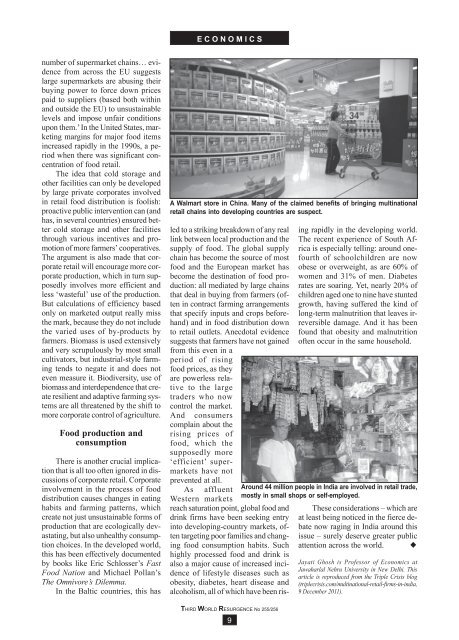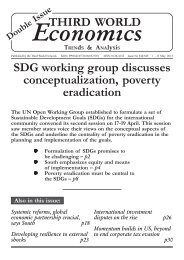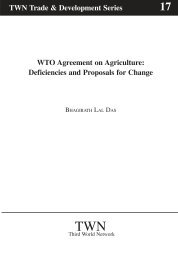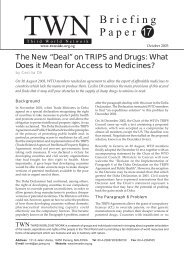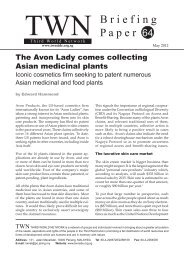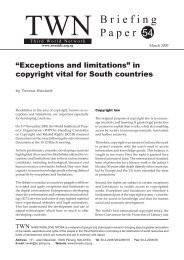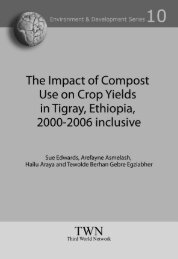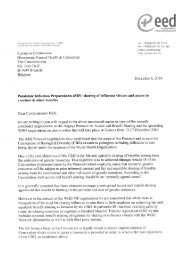Download - Third World Network
Download - Third World Network
Download - Third World Network
Create successful ePaper yourself
Turn your PDF publications into a flip-book with our unique Google optimized e-Paper software.
E C O N O M I C S<br />
number of supermarket chains… evidence<br />
from across the EU suggests<br />
large supermarkets are abusing their<br />
buying power to force down prices<br />
paid to suppliers (based both within<br />
and outside the EU) to unsustainable<br />
levels and impose unfair conditions<br />
upon them.’ In the United States, marketing<br />
margins for major food items<br />
increased rapidly in the 1990s, a period<br />
when there was significant concentration<br />
of food retail.<br />
The idea that cold storage and<br />
other facilities can only be developed<br />
by large private corporates involved<br />
in retail food distribution is foolish:<br />
proactive public intervention can (and<br />
has, in several countries) ensured better<br />
cold storage and other facilities<br />
through various incentives and promotion<br />
of more farmers’ cooperatives.<br />
The argument is also made that corporate<br />
retail will encourage more corporate<br />
production, which in turn supposedly<br />
involves more efficient and<br />
less ‘wasteful’ use of the production.<br />
But calculations of efficiency based<br />
only on marketed output really miss<br />
the mark, because they do not include<br />
the varied uses of by-products by<br />
farmers. Biomass is used extensively<br />
and very scrupulously by most small<br />
cultivators, but industrial-style farming<br />
tends to negate it and does not<br />
even measure it. Biodiversity, use of<br />
biomass and interdependence that create<br />
resilient and adaptive farming systems<br />
are all threatened by the shift to<br />
more corporate control of agriculture.<br />
Food production and<br />
consumption<br />
There is another crucial implication<br />
that is all too often ignored in discussions<br />
of corporate retail. Corporate<br />
involvement in the process of food<br />
distribution causes changes in eating<br />
habits and farming patterns, which<br />
create not just unsustainable forms of<br />
production that are ecologically devastating,<br />
but also unhealthy consumption<br />
choices. In the developed world,<br />
this has been effectively documented<br />
by books like Eric Schlosser’s Fast<br />
Food Nation and Michael Pollan’s<br />
The Omnivore’s Dilemma.<br />
In the Baltic countries, this has<br />
A Walmart store in China. Many of the claimed benefits of bringing multinational<br />
retail chains into developing countries are suspect.<br />
led to a striking breakdown of any real<br />
link between local production and the<br />
supply of food. The global supply<br />
chain has become the source of most<br />
food and the European market has<br />
become the destination of food production:<br />
all mediated by large chains<br />
that deal in buying from farmers (often<br />
in contract farming arrangements<br />
that specify inputs and crops beforehand)<br />
and in food distribution down<br />
to retail outlets. Anecdotal evidence<br />
suggests that farmers have not gained<br />
from this even in a<br />
period of rising<br />
food prices, as they<br />
are powerless relative<br />
to the large<br />
traders who now<br />
control the market.<br />
And consumers<br />
complain about the<br />
rising prices of<br />
food, which the<br />
supposedly more<br />
‘efficient’ supermarkets<br />
have not<br />
prevented at all.<br />
As affluent<br />
Western markets<br />
reach saturation point, global food and<br />
drink firms have been seeking entry<br />
into developing-country markets, often<br />
targeting poor families and changing<br />
food consumption habits. Such<br />
highly processed food and drink is<br />
also a major cause of increased incidence<br />
of lifestyle diseases such as<br />
obesity, diabetes, heart disease and<br />
alcoholism, all of which have been rising<br />
rapidly in the developing world.<br />
The recent experience of South Africa<br />
is especially telling: around onefourth<br />
of schoolchildren are now<br />
obese or overweight, as are 60% of<br />
women and 31% of men. Diabetes<br />
rates are soaring. Yet, nearly 20% of<br />
children aged one to nine have stunted<br />
growth, having suffered the kind of<br />
long-term malnutrition that leaves irreversible<br />
damage. And it has been<br />
found that obesity and malnutrition<br />
often occur in the same household.<br />
Around 44 million people in India are involved in retail trade,<br />
mostly in small shops or self-employed.<br />
These considerations – which are<br />
at least being noticed in the fierce debate<br />
now raging in India around this<br />
issue – surely deserve greater public<br />
attention across the world. ÿu<br />
Jayati Ghosh is Professor of Economics at<br />
Jawaharlal Nehru University in New Delhi. This<br />
article is reproduced from the Triple Crisis blog<br />
(triplecrisis.com/multinational-retail-firms-in-india,<br />
9 December 2011).<br />
THIRD WORLD RESURGENCE No 255/256<br />
9


